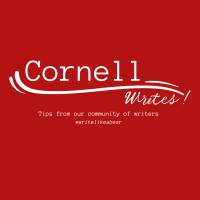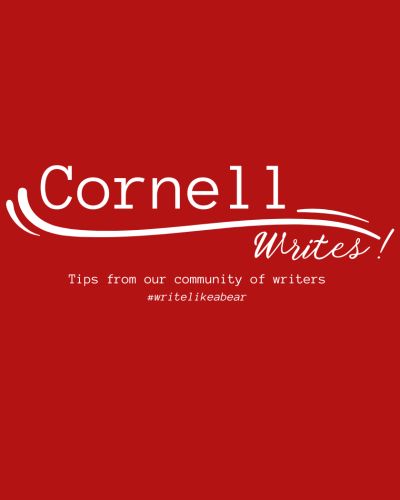Cornell Writes! Tips from our community of writers is a digital newsletter sponsored by the Knight Institute for Writing in the Disciplines and the Cornell University Graduate School.
Each week, a member of our writing community – a Graduate Writing Service, English Language Support Office, or Cornell Writing Centers tutor; a writing specialist from the Knight Institute; a writing instructor from our First-Year Writing Seminars or Writing in the Majors programs; maybe YOU – will share a writing strategy from their own writer’s toolkit. #writelikeabear
Contact Tracy Hamler Carrick with questions and ideas.
Meet Tracy Carrick
Hello Cornell writers! My name is Tracy Carrick. I am a teacher, tutor, and director of the Knight Institute’s Writing Workshop and Graduate Writing Service. I am also a writer and editor. This week, I am responding to student writing, preparing a grant application, and writing a letter to Santa.
Here is this week’s Writing Tip!
In her Cornell Writes! piece, Process Journaling Creates Space!, my colleague Kate Navickas shared her experience developing the daily practice of keeping a writing journal. Like many writers, Kate discovered that keeping a journal helped her to get to the task of writing every day.
For some writers, journaling each day, especially when drafting a substantial writing project, serves as an essential warm-up exercise, helping to get fingers and mind coordinated, to map out plans, and/or to set goals. Sometimes writers find that the writing produced in a journal entry finds its way into a draft. What a gift!
I am especially interested in Kate’s practice of journaling on emotions.
While she was writing her dissertation, Kate started each writing session with an emotions check-in, often, as she explains, as a way to process negative emotions (frustration, annoyance, judgment) so that she could set them aside or figure out ways to put them to work.
In her advice to us, Kate also encourages writers to reach for the positive, and that is where I’d like to pick up today.
While it is important to acknowledge the disruptive role that our negative emotions can play in our writing lives, it is equally important to motivate ourselves to see and celebrate the positive emotions that fuel our desire to write, to keep writing, and to be writers.
As Martin Seligman, Director of the UPenn Positive Psychology Center, wrote in his 2013 book, Flourish: A Visionary New Understanding of Happiness and Well-being, “when we take time to notice the things that go right – it means we’re getting a lot of little rewards throughout the day." That is, when we start our days – at least some of them – with constructive and hopeful journal entries, we can not only set an optimistic course for the day, but also commit ourselves to the process of training ourselves to focus on the ways we are reaching toward our writing goals rather than failing to meet them.
What does positive emotion journaling look like?
Zoom in! One of the ways that I have found to write myself out of the bramble of negative emotions is to narrow my gaze. Here are a few prompts:
- Write about a single accomplishment. Did you complete a draft or a section of a draft; format your bibliography; finish coding a data set or analyzing research; compose a clear, concise, precise articulation of your argument; come up with the perfect title; find your dream source or the courage to share a draft with a friend or a mentor? Write about how you reached this milestone and why it is important to your work.
- Write in response to the “Three Good Things” activity. What three things went well yesterday or in the last week or in your current draft or drafting process? Write about what or who brought about those good things. (Seligman, Steen, Park, & Peterson, 2005).
- Write a negative into a positive. What sticky issue is in your way? Write about how you can connect it with something you have mastered or feel good about, and/or how you can turn it into a challenge or a question or a reason to make a connection with someone.
Zoom Out! When the details are too sharp and I need to dodge those prickly thorns, I opt instead to step back and widen my lens. Here are a few prompts:
- Write about why you are writing. What is motivating your current project and why is it important and important to you? Write about why you are the right person – yes, you are! – to be writing this now.
- Write about the impact you have had or hope to have. What will your work do to enhance, extend, or change the scholarly conversation and/or the material realities of others? Write about why your work matters – yes, it does! – and why it matters now.
- Write about your aspirations. How does the project you are working today help you build toward your ideal professional identity and scholarly goals? Write about your field – with you featured prominently in it! – and how this project will steer its course.
Change the lens! The journaling practice of zooming in and zooming out is not always enough to cast light on my darkness. On those days, I remind myself that taking a break from work or the project I am working on is okay. And it is! (See It’s okay if you cannot write today.) But recently, I have been reading about the benefits of expressing gratitude and learning that I may be able to boost my writing process by adjusting not only what I am seeing, but also how I am seeing.
For the last two decades, pioneers in positive psychology have documented the benefits of expressing gratitude. In a recent comprehensive white paper, “The Science of Gratitude,” UC Berkeley's Greater Good Science Center recognizes that, among other important benefits, regularly expressing gratitude:
- improved general well being, including physical health;
- increased mood, self-esteem, resilience, and overall happiness;
- prevented burnout; and
- encouraged the development of patience, humility, and wisdom (pp. 28-40).
Yes, please, to a little more of all of these things in my writing life. Yes, please, to more of all of these things, always.
As we move into the new year to write our next chapters or the next drafts of chapters, I hope you will join me in the practice of GRATITUDE JOURNALING.
Here are a few new prompts for my writer’s journal inspired by research in positive psychology and happiness studies:
- Write about something you are grateful for. What circumstances have brought you here to this place, to this work, to this particular project? What conditions make your writing life possible? What happened yesterday or last week or last year to motivate or inspire you to research or write? (Kerr, O’Donovan, & Pepping, 2014)
- Write about someone you are grateful for. Who do you write for, about, or with? What have they done to support you or your thinking or your drive? What idea or project or spirit have they inspired? How did they shift or affirm the direction of your studies, your research, or your draft? (Wong et al., 2016)
- Write a gratitude letter and share it. How might you transform a gratitude journal entry into a letter? What details and framing must you alter as you imagine a different audience? How does writing for a reader help you reflect differently on your gratitude and its impact? What might the letter mean to them? (Toepfer et al., 2012)
Before I sign off for a much needed break to spend joyful holiday time with my family and friends, I’ll express my gratitude to you, to our growing numbers of weekly subscribers, and especially to the handful of you who have reached out with personal notes. Thank you for reading and thank you for writing!
When you see me again in 2024, I’ll be the one with a rose-colored lens in one hand and gratitude in the other.
Be merry and write!
References
- Kerr, S. L., O’Donovan, A., & Pepping, C. A. (2014). Can Gratitude and Kindness Interventions Enhance Well-Being in a Clinical Sample? Journal of Happiness Studies, 16(1), 17–36. https://doi.org/10.1007/s10902-013-9492-1
- Seligman, M. (2013). Flourish: A visionary new understanding of happiness and well-being. Atria Paperback.
- Seligman, M. E. P., Steen, T. A., Park, N., & Peterson, C. (2005). Positive Psychology Progress: Empirical Validation of Interventions. American Psychologist, 60(5), 410–421. https://doi.org/10.1037/0003-066X.60.5.410
- The Greater Good Science Center (2018 May). The science of gratitude. Greater Good Science Center at UC Berkeley.
- Toepfer, S. M., Cichy, K., & Peters, P. (2012). Letters of Gratitude: Further Evidence for Author Benefits. Journal of Happiness Studies, 13(1), 187–201. https://doi.org/10.1007/ s10902-011-9257-7
- Wong, J., Owen, J., Gabana, N. T., Brown, J. W., Mcinnis, S., Toth, P., & Gilman, L. (2016). Does gratitude writing improve the mental health of psychotherapy clients? Evidence from a randomized controlled trial. Psychotherapy Research, 28(2), 192-202. https://doi.org/10.1080/10503307 .2016.1169332




